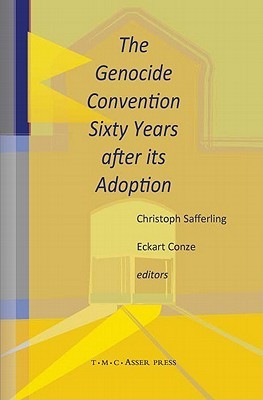
- We will send in 10–14 business days.
- Publisher: T.M.C. Asser Press
- Year: 2010
- Pages: 316
- ISBN-10: 906704315X
- ISBN-13: 9789067043151
- Format: 24.6 x 16.8 x 2.3 cm, hardcover
- Language: English
- SAVE -10% with code: EXTRA
The Genocide Convention Sixty Years After Its Adoption (e-book) (used book) | bookbook.eu
Reviews
Description
In 1948 the Convention on the Prevention and Punishment of the Crime of Genocide was adopted by the General Assembly of the United Nations. Thereby genocide was defined as an international crime. Sixty years after its adoption, the prosecution of the crime of genocide still raises multiple questions. Although genocide was not a crime during the Nuremberg Trial its historic roots rest with the persecution of Jews and other minorities by Nazi-Germany. Because of this historic focus the legal definition of genocide is difficult to apply to other conflicts. Bringing together scholars and practitioners, this volume of essays examines the Genocide Convention from historic, legal and social science perspectives. Contemporary witnesses also report on their experiences of the Nuremberg, the Eichmann and the Auschwitz trials.
EXTRA 10 % discount with code: EXTRA
The promotion ends in 19d.21:09:35
The discount code is valid when purchasing from 10 €. Discounts do not stack.
- Publisher: T.M.C. Asser Press
- Year: 2010
- Pages: 316
- ISBN-10: 906704315X
- ISBN-13: 9789067043151
- Format: 24.6 x 16.8 x 2.3 cm, hardcover
- Language: English English
In 1948 the Convention on the Prevention and Punishment of the Crime of Genocide was adopted by the General Assembly of the United Nations. Thereby genocide was defined as an international crime. Sixty years after its adoption, the prosecution of the crime of genocide still raises multiple questions. Although genocide was not a crime during the Nuremberg Trial its historic roots rest with the persecution of Jews and other minorities by Nazi-Germany. Because of this historic focus the legal definition of genocide is difficult to apply to other conflicts. Bringing together scholars and practitioners, this volume of essays examines the Genocide Convention from historic, legal and social science perspectives. Contemporary witnesses also report on their experiences of the Nuremberg, the Eichmann and the Auschwitz trials.


Reviews